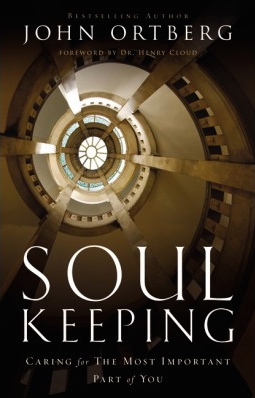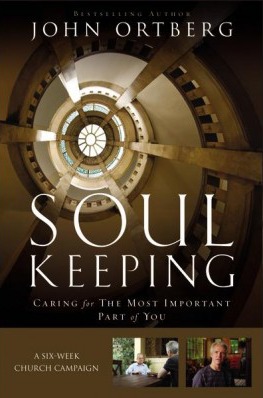There are a few books in my library, gathered over 50 years, that I would describe as soul-enriching. Pastors I know also treasure them. They’re modern classics: Loving God by J.I. Packer, The Divine Conspiracy by Dallas Willard, A Celebration of Disciplines by Richard Foster, and several others. This book has lovingly been placed into that revered collection.
Soul Keeping, by John Ortberg, is a volume to be tasted, savored and then ingested, slowly, in small bites, to heighten Spirit-enlivened appetite, nourish and satisfy one’s entire being from the inside out.
Ortberg distills much of Dallas Willard’s thoughts in this short but accessible book. Willard, known for his inner richness and contemplative enjoyment of God, mentored Ortberg through simple, casual conversations, greatly enhancing his spiritual thinking, resulting in Soul Keeping.
Soul Keeping opens up the meaning of the soul – what it is not, what can happen to a person whose soul is neglected, what the soul needs to thrive, and what to do if the soul has become damaged. He expands on the oft-mistaken assumption that the soul is synonymous to the self:
We’re all about the self. We revolve our lives around ourselves.
Ironically, the more obsessed we are with our selves, the more we neglect our souls.
All of our language reflects this. If you’re empty, you need to fulfill yourself. If you’re stressed, learn how to take care of yourself. If you’re on a job interview, you have to believe in yourself. If you’re in the tattoo parlor, you must learn to express yourself. If someone dares to criticize you, you have to love yourself. If you’re not getting your own way, you have to stand up for yourself. What should you do on a date? You ought to be yourself.
What if your self is a train wreck? What do you do then?
Self is a stand-alone, do-it-yourself unit, while the soul reminds us we were not made for ourselves. The soul always exists before God. So soul is needed for deep art, poetry, and music… Imagine singing, ‘Then sings my self, my Savior God to thee,’ or ‘Jesus, lover of my self.’ Innately we know that the self is not the soul, even as we do everything we can to preserve it.
Ortberg brings to mind the beloved old hymn:
When peace, like a river, attendeth my way,
When sorrows like sea billows roll;
Whatever my lot, Thou hast taught me to say,
It is well, it is well with my soul.
And then he asks the question, “So what makes it well with my soul?”
The book answers that question by expanding on Ortberg’s premise that “It’s the nature of the Soul to need.” Helpfully, he works through what the soul needs. Consider this intriguing list
1.The Soul Needs a Keeper
2. The Soul Needs a Center
3. The Soul Needs a Future
4. The Soul Needs to Be with God
He explains: “If you read through the Bible, you get the sense that the soul was designed to search for God. The Hebrew Scriptures – which might be thought of as the Great Soul-Book of human literature – are almost obsessed with this thought. The soul thirsts for the Mighty One (Psalm 63:1). It thirsts for Him like parched land thirsts for water (Psalm 143:6). Like a laser it focuses the full intensity of its desire on Him (Psalm 33:20). It lifts itself up to Him (Psalm 25:1), it blesses Him (Psalm 103:1-2, Psalm 103:22), it clings to Him (Psalm 63:8), and it waits for Him in silence (Psalm 62:1). ‘Indeed, the soul lives in God.’… Because it is desperate to be whole, the soul is God-smitten and God-crazy and God-obsessed… My soul will never find rest until it rests in God.”
5. The Soul Needs Rest
6. The Soul Needs Freedom
Freedom! Whether William Wallace or our own selves, “the soul cries out to be free, but the common perception is that Christianity stands in the way of freedom. It’s all about obeying someone or something that tries to tell you how to live your life. As a Christian, according to this perception, you’re not free at all, but submissive, dependent, and enslaved by your religion. So people wonder – does God infringe on your soul’s need for freedom?..
Think of freedom coming in two flavors, two kinds of freedom. There is freedom from external constraints, somebody telling me what to do. This freedom from. But there is another kind of freedom that might be called freedom for. There’s the freedom for living the kind of life I was made to live, freedom for becoming that man I most want to be – freedom for.
You do not have to be an expert to recognize that the kind of freedom our culture craves is freedom from external restraints…. You’re not the boss of me! Freedom from external restraints appeals to all of us, but I do not believe that it’s the freedom the soul needs…This kind of freedom is internal, and it is precious. It is ‘soul-freedom.’ … How do you get the freedom that your soul craves?
This is the great irony about freedom…. True freedom comes when you embrace God’s overall design for the world and your place in it. This is why in the Bible you see this strong connection between God’s law and soul-freedom.”
7. The Soul Needs Blessing
8. The Soul Needs Satisfaction
9. The Soul Needs Gratitude
Ortberg wraps up his thinking by looking toward “The Soul Restored”, following “Dark Night of the Soul” with the final chapter, “Morning.”
For such a heavenly topic, the book is practical, enjoyable, even humorous, yet a bit disturbing, challenging and, most certainly, inspiring. It is particularly essential for every pastor’s spiritual health.
Dear Pastor, run to this book! Relish this book! Absorb this book! For your own soul’s sake, allow this book to permeate and refresh you.
Highlights from the Author Chat:
- The Looney Tunes theory of the soul
- What is an unhealthy soul?
- What is a lost soul?
- How can we care for our souls?
- What do we do with our infinite neediness at the core of our being?
- How do our souls “feel their worth”?
- How to find deep contentment in God
- God is able to heal broken souls!
Watch the Conversation Now:
* * *
Your Turn
Pastors, we’d love to hear from you about caring for your souls! Join the conversation on our blog!




